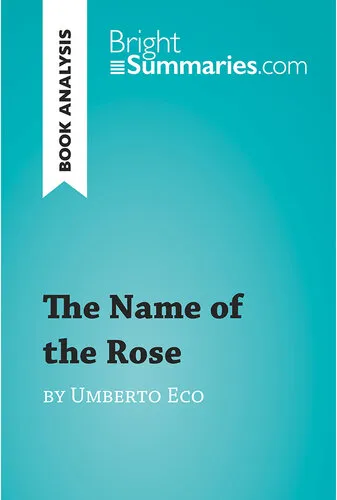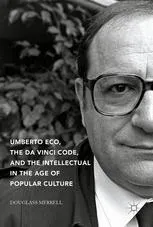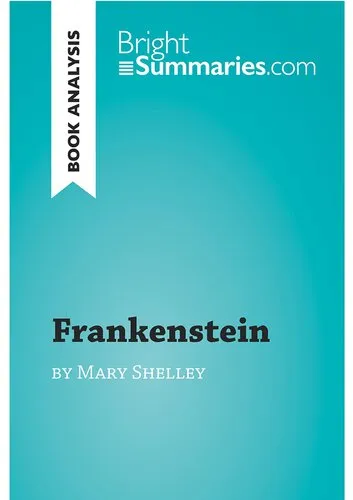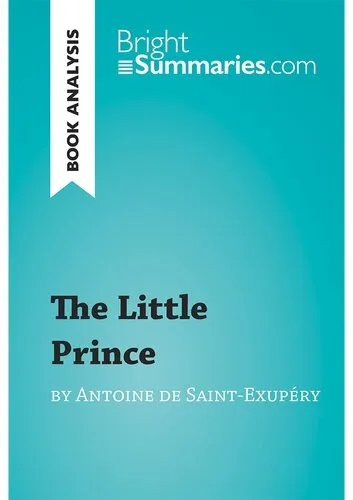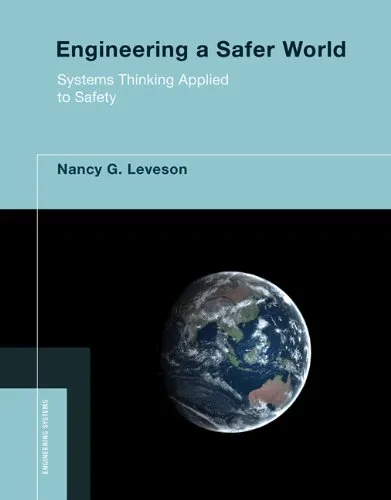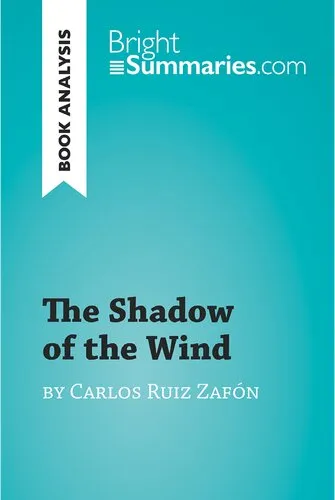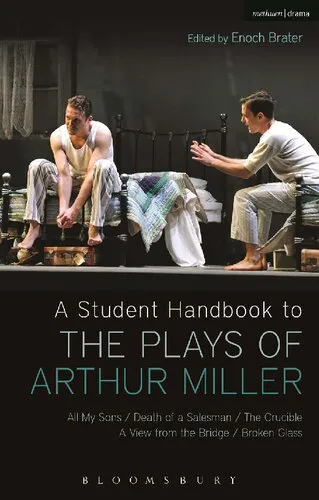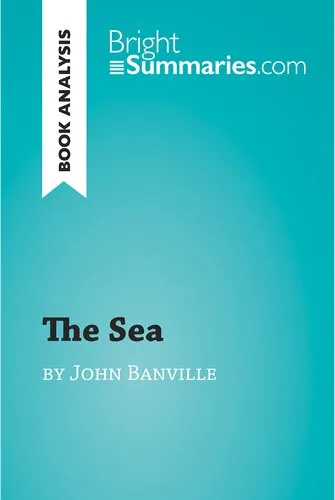The Name of the Rose by Umberto Eco (Book Analysis): Detailed Summary, Analysis and Reading Guide
4.0
بر اساس نظر کاربران

شما میتونید سوالاتتون در باره کتاب رو از هوش مصنوعیش بعد از ورود بپرسید
هر دانلود یا پرسش از هوش مصنوعی 2 امتیاز لازم دارد، برای بدست آوردن امتیاز رایگان، به صفحه ی راهنمای امتیازات سر بزنید و یک سری کار ارزشمند انجام بدینکتاب های مرتبط:
معرفی کتاب
نام گل سرخ اثر اومبرتو اکو، یکی از آثار برجسته و پیچیده ادبیات معاصر است که توانسته است به خوبی میراث غنی قرون وسطی را با نوآوریهای فکری و شیوه روایتی مدرن درآمیزد. این رمان با محتوای فلسفیاش، خواننده را به دنیای فکری و رازآلود ایتالیا در قرن چهاردهم میبرد و فراتر از یک داستان جنایی، تفکری عمیق درباره دین، قدرت و دانش ارائه میکند.
خلاصهای دقیق از کتاب
داستان "نام گل سرخ" در یک صومعه بنکارای ایتالیا در سال ۱۳۲۷ جریان دارد. شخصیت اصلی این رمان، ویلیام باسکرویل، یک راهب فراستیک و طرفدار علم و دانش است که به همراه دستیار جوانش، ادسو، به این صومعه سفر میکند تا راز مرگ مرموز چند راهب را کشف کند. این جستجو که در محیطی رازآلود و پر از کتابهای مخفی و دانش ممنوعه قرار دارد، به شکلی بینظیر پیچیده است و هر مرحله از آن به فاش شدن حقایقی درباره تعاریف قدرت و دین میانجامد.
نکات کلیدی
- پیوند عمیق و پیچیده میان دین و دانش در قرون وسطی.
- بررسی انتقادی نهادهای قدرت و دین و تأثیر آنها بر فرد و جامعه.
- تحلیل اهمیت علم و عقلگرایی در تمیز حقیقت از خرافات.
جملات معروف کتاب
"ما هرگز نمیتوانیم حقیقت را به تمامی بشناسیم، تنها میتوانیم بخشهایی از آن را تجربه کنیم."
"کتابها چراغهایی هستند که در شبهای تاریک تاریخ جهان میدرخشند."
چرا این کتاب اهمیت دارد
نام گل سرخ نه تنها به عنوان یک رمان معمایی مهیج شناخته میشود، بلکه به خاطر بررسی عمیق مفاهیم فلسفی و تاریخی نیز مورد تحسین قرار گرفته است. استفاده از عناصر تاریخی و تحلیلهای فلسفی اکو، بستر را برای بحثهای ادبی و اجتماعی گستردهای فراهم میآورد که همچنان در دوره مدرن نیز مورد توجه هستند. این کتاب نه تنها اطلاعاتی درباره تاریخ و فرهنگ قرون وسطی ارائه میدهد، بلکه خواننده را به درک بهتر از تأثیرات دین و قدرت بر جوامع انسانی هدایت میکند.
Introduction
Welcome to the comprehensive analysis of "The Name of the Rose" by Umberto Eco, a captivating work that brilliantly intertwines historical fiction with a detective story. This guide will delve into the intricate facets of Eco's masterpiece, offering readers an in-depth understanding of its themes, characters, and complexities.
Umberto Eco, an Italian novelist and semiotician, crafts an enigmatic narrative set in the 14th century, where philosophy, theology, and literary analysis converge within the confines of a medieval monastery. "The Name of the Rose" is much more than a mere historical narrative; it is a stimulating intellectual adventure, a work of historical metaphysics complemented by mystery and suspense. This book analysis aims to unravel the layers of Eco's text, offering insights into its historical background, philosophical reflections, and the profound questions it raises.
Spanning over 500 pages, Eco's novel is rich with symbolic elements, enigmatic characters, and long-forgotten scholarly debates. As you embark on this analytical journey, you'll explore various dimensions of the text, each carefully dissected to provide a clearer picture of Eco's expansive world. From the subtlety of the semiotic clues to the reverberations of theological inquiries, every corner of this narrative awaits discovery.
Detailed Summary of the Book
This section provides an exhaustive summary of "The Name of the Rose," capturing its essence while guiding you through its intricate plot. The story is set in 1327 and follows the Franciscan friar William of Baskerville and his novice, Adso of Melk, during their visit to a Benedictine monastery in Italy. As they arrive for a theological debate, a series of bizarre deaths unfolds, propelling William and Adso into a whirlwind of secrets and intrigue.
William, a character inspired by Sherlock Holmes, employs logic and deductive reasoning to solve the mystery, unraveling themes of power, corruption, and the eternal struggle between faith and reason. As you delve deeper into this analysis, you will discover how Eco deftly intertwines these elements with historical events of the time, offering a narrative that resonates with universal human concerns.
Key Takeaways
"The Name of the Rose" presents multiple key takeaways, prompting readers to reflect on significant philosophical and theological questions.
- The Complexity of Truth: Eco explores the elusive nature of truth and how it is perceived differently by individuals.
- The Power of Knowledge: Knowledge is depicted as a double-edged sword, capable of enlightening and corrupting.
- The Interplay of Faith and Reason: The novel insightfully examines the tension between faith and rationality, a recurring theme throughout human history.
Famous Quotes from the Book
Eco's novel is replete with memorable quotes that encapsulate its profound themes. Here are a few:
"Books are not made to be believed, but to be subjected to inquiry."
"Wherever there is light, there is also shadow."
"The library is a metaphor for society and, like society, can either be a place of shared knowledge or one of suppressive upheaval."
Why This Book Matters
"The Name of the Rose" is a seminal work that transcends time, offering relevance to contemporary audiences. The novel's significance lies in its multifaceted exploration of humanity's quest for meaning in an ever-complex world.
The ethical dilemmas and ideological conflicts portrayed mirror modern-day challenges, providing a timeless reflection on the human condition. Eco's rich narrative not only entertains but also encourages readers to question the societal structures around them and their perceptions of truth and morality.
Through this guide, you will gain a deeper appreciation for Eco's literary craftsmanship and the enduring impact of "The Name of the Rose." Whether you are an ardent scholar or a casual reader, this analysis seeks to enrich your understanding of one of the 20th century's most pivotal novels.
دانلود رایگان مستقیم
شما میتونید سوالاتتون در باره کتاب رو از هوش مصنوعیش بعد از ورود بپرسید
دسترسی به کتابها از طریق پلتفرمهای قانونی و کتابخانههای عمومی نه تنها از حقوق نویسندگان و ناشران حمایت میکند، بلکه به پایداری فرهنگ کتابخوانی نیز کمک میرساند. پیش از دانلود، لحظهای به بررسی این گزینهها فکر کنید.
این کتاب رو در پلتفرم های دیگه ببینید
WorldCat به شما کمک میکنه تا کتاب ها رو در کتابخانه های سراسر دنیا پیدا کنید
امتیازها، نظرات تخصصی و صحبت ها درباره کتاب را در Goodreads ببینید
کتابهای کمیاب یا دست دوم را در AbeBooks پیدا کنید و بخرید
1579
بازدید4.0
امتیاز0
نظر98%
رضایتنظرات:
4.0
بر اساس 0 نظر کاربران
Questions & Answers
Ask questions about this book or help others by answering
No questions yet. Be the first to ask!
